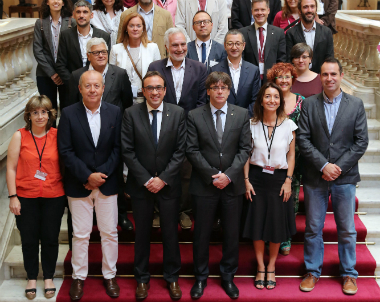- The new legislation will regulate pollution-causing activities and aims to reduce emissions by 40% by 2030 and 100% by 2050
- President Puigdemont: “This law reinforces the international positioning of Catalonia in line with that established by the Paris Agreement on climate change”

Catalonia has strengthened its climate efforts with the approval in Parliament of the Law on Climate Change on July 27, which foresees the creation of taxes on large vessels and business activities producing large-scale pollution. The bill, which was passed with support from all the Catalan political groups except the People’s Party, aims to achieve a reduction in GHG emissions of 40% by 2030, 65% by 2040 and 100% by 2050.
Following its approval, the Minister of Territory and Sustainability, Josep Rull, affirmed that Catalonia “has shown that it speaks the same language as other more advanced societies in the fight against climate change” and announced the Catalan Government’s intention to implement the new taxes by December 1 this year, with the new law going into force in 2019.
As the first law of its kind in the south of Europe, the Climate Change Bill will tax businesses around 10 euros on each tonne of carbon dioxide emitted, which will increase automatically every two years, to approximately 30 euros per tonne in 2025. Large ships will be taxed approximately 1,000 euros for each ton of nitrogen oxide emitted, and the bill will also reinforce the existing carbon tax on polluting cars, a levy which had already been introduced within the framework of the 2017 budget.
The money raised through these taxes will fund a host of climate actions, such as the promotion renewable energy and energy-efficient houses. The revenue generated will also go to the Climate Change Fund, the Natural Heritage Fund and the Fund for the Protection of the Atmospheric Environment to bolster and promote mitigation and adaptation policies, renewable energies, self-consumption of electricity and energy efficient housing, as well as sustainable mobility, water saving policies and the sustainable production processes.
Furthermore, the tax will also be applied to oil and gas refineries, the metallurgical industry, cement manufacturers, glass and paper factories, the chemical industry, fertilizer manufacturers, large abattoirs and cattle sheds and facilities for eliminating dangerous waste and mines, among others.
The President of the Catalan Government, Carles Puigdemont stated that the Law “reinforces the international positioning of Catalonia in line with that established by the Paris Agreement on climate change”. “The struggle against climate change is not a project of the Government of Catalonia, but rather a national challenge […] It is something that has a direct impact on our prosperity and the economic model on which our country is based”, he assured.
Transparency
Catalonia serves as co-chair for The Climate Group’s States & Regions Alliance and is part of the Under2 Coalition. It has been at the forefront of transparent climate action, agreeing to voluntarily disclose its emissions and ambitious climate targets on an annual basis since 2014 as part of The Climate Group and CDP’s Annual Disclosure initiative with states and regions.